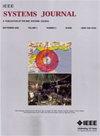Game-Theoretic Joint Coalition Formation and Power Allocation Strategy for Multitarget Tracking in Distributed Radar Network
IF 4.4
3区 计算机科学
Q1 COMPUTER SCIENCE, INFORMATION SYSTEMS
引用次数: 0
Abstract
In this article, a game-theoretic joint coalition formation and power allocation (JCFPA) strategy is investigated for multitarget tracking (MTT) in a distributed radar network. The main objective of the presented strategy is to minimize the total transmit power consumption and enhance the target tracking accuracy concurrently, while adhering to predefined requirements on the MTT performance and system illumination resource budgets, thus improving the low probability of intercept performance. To achieve this, a utility function is developed to evaluate the coalition structure, transmit power consumption, and tracking accuracy. Then, by formulating the cooperative interactions among radars as a coalition game, we establish an optimization model to optimize the coalition structure and power allocation for the distributed radar network. The existence of the Nash equilibrium solution for the game is proven mathematically. To address the optimization model, an iterative three-step algorithm is developed based on the sequential quadratic programming. Numerical results reveal that the presented JCFPA strategy obtains superior system performance compared to other benchmarks.分布式雷达网络中多目标跟踪的博弈论联合联盟形成与功率分配策略
本文研究了分布式雷达网络中多目标跟踪的博弈论联合联盟形成与权力分配策略。该策略的主要目标是最小化发射总功耗,同时提高目标跟踪精度,同时坚持对MTT性能和系统照明资源预算的预定要求,从而改善低概率拦截性能。为了实现这一目标,开发了效用函数来评估联盟结构、传输功耗和跟踪精度。然后,通过将雷达之间的合作互动表述为联盟博弈,建立了分布式雷达网络的联盟结构和功率分配优化模型。用数学方法证明了博弈纳什均衡解的存在性。针对该优化模型,提出了一种基于顺序二次规划的迭代三步算法。数值结果表明,与其他基准测试相比,所提出的JCFPA策略获得了更好的系统性能。
本文章由计算机程序翻译,如有差异,请以英文原文为准。
求助全文
约1分钟内获得全文
求助全文
来源期刊

IEEE Systems Journal
工程技术-电信学
CiteScore
9.80
自引率
6.80%
发文量
572
审稿时长
4.9 months
期刊介绍:
This publication provides a systems-level, focused forum for application-oriented manuscripts that address complex systems and system-of-systems of national and global significance. It intends to encourage and facilitate cooperation and interaction among IEEE Societies with systems-level and systems engineering interest, and to attract non-IEEE contributors and readers from around the globe. Our IEEE Systems Council job is to address issues in new ways that are not solvable in the domains of the existing IEEE or other societies or global organizations. These problems do not fit within traditional hierarchical boundaries. For example, disaster response such as that triggered by Hurricane Katrina, tsunamis, or current volcanic eruptions is not solvable by pure engineering solutions. We need to think about changing and enlarging the paradigm to include systems issues.
 求助内容:
求助内容: 应助结果提醒方式:
应助结果提醒方式:


